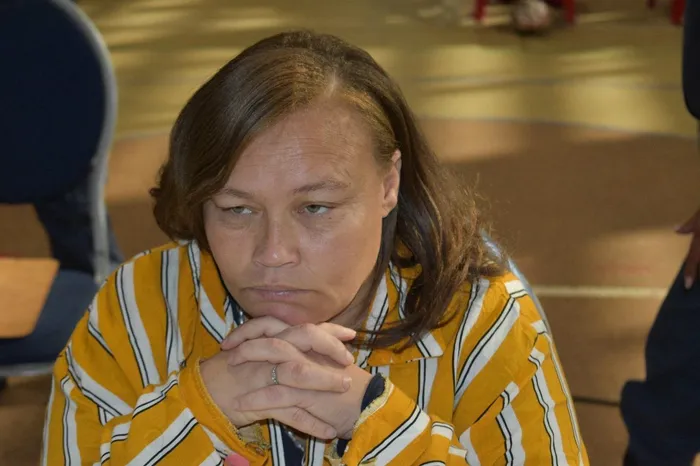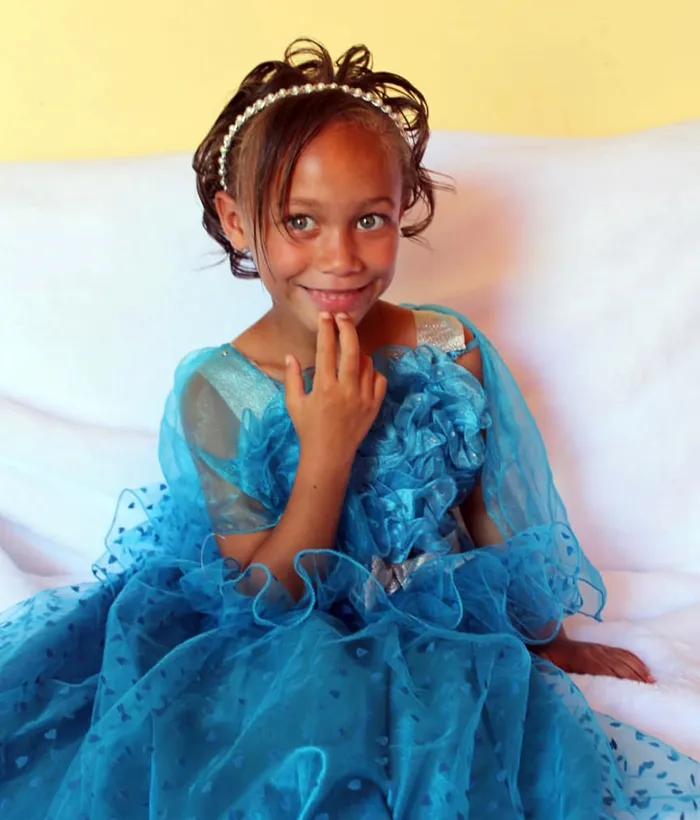‘She was treated like a commodity’: All three accused found guilty in Joshlin Smith case

Racquel ‘Kelly’ Smith was found guilty of kidnapping and trafficking six-year-old Joshlin Smith in the Western Cape High Court on Friday.
Image: Ian Landsberg / Independent Media
Two months since the Western Cape High Court was proclaimed in Saldanha Bay, judgment was delivered on Friday in the trial of Racquel ‘Kelly’ Smith, Jacquen ‘Boeta’ Appollis, and Steveno ‘Steffie’ van Rhyn for their roles in the disappearance and trafficking of six-year-old Joshlin.
Judge Nathan Erasmus, who presided over the case, delivered a detailed judgment that recapped a highly emotive and complex trial that began on March 3.
The venue, White City Multipurpose Centre in Diazville, turned courtroom, was proclaimed a High Court venue under special judicial authority due to the extraordinary nature of the case and logistical constraints in the region, and public interest surrounding the case.

Joshlin Smith has been missing since February 19, 2024.
Image: Supplied
Erasmus thanked the community members who prayed and stood vigil outside the courtroom throughout the proceedings.
Hours after the judgment, the place Joshlin once called home was burned to the ground.
Police spokesperson Lieutenant-Colonel Malcolm Pojie said: “Saldanha SAPS in the Western Cape registered a case of arson for investigation on Friday evening after Kelly Smith’s Middelpos dwelling was destroyed in a fire.
“An adult female has been taken in for questioning.”
Joshlin was last seen on February 19, 2024, from her home in Middelpos, Saldanha Bay.
She was last seen around 2pm on the day in question.
The State alleged that she was trafficked during that period and brought charges under Section 4 of the Prevention and Combating of Trafficking in Persons Act.
Alternate charges included kidnapping, child neglect, and defeating the ends of justice.
To prove trafficking, the State needed to show that one or more of the accused delivered, transported, exchanged, or received Joshlin, and that it was done for exploitation or with intent.
Over two months, 35 State witnesses were called, including investigating officers, community members, and a co-accused turned State witness, Lourentia ‘Renz’ Lombaard.
Only one defence witness testified during a trial-within-a-trial for Accused 1, Appollis.
The trial-within-a-trial focused on whether confessions made by Appollis and Van Rhyn were made freely and voluntarily.
Defence counsel argued these statements were obtained through coercion, sleep deprivation, and torture by police at the Sea Border Police Unit Offices.
Van Rhyn had testified that he was deprived of food and sleep, assaulted, and forced into a false confession.
He said officers put a bag over his head and hit him with a pipe, which later became a crutch when he exited the building injured.
Appollis also alleged abuse and coercion.
However, the judge noted contradictions in their testimonies, inconsistencies with the timeline, and the lack of credible evidence to support the torture claims.
During the arguments, the State said they noted that both accused never called Joshlin by her name but instead referred to her as ‘die kind’.
However, Judge Erasmus found the police versions more credible and ruled the confessions admissible.
Lombaard’s testimony was central to the State’s case. Though Erasmus acknowledged she was not a perfect witness and had given multiple versions of events, he found her account reliable in key respects.
She corroborated details of the plan to “sell” Joshlin for R20 000, implicating both Appollis and Kelly in the planning and execution.
Judge Erasmus recalled the evidence that in 2018, a woman named Natasha Andrews wanted to adopt Joshlin. By 2024, this desire had turned into a motive, as Kelly allegedly told Appollis that she wanted to sell the child because Andrews wouldn’t stop asking about her.
Kelly’s lack of concern during the disappearance, including going to sleep rather than searching for her daughter, struck Erasmus as inconsistent with the behaviour of a distressed parent.
As for the evidence of community member Steven Coetzee, who said Kelly spoke about selling her children, Erasmus accepted it as credible and supported Lombaard's version.
Erasmus found all three accused guilty on the main charge of human trafficking. He said it was clear from the totality of evidence, particularly from the testimonies of Lombaard and Coetzee, as well as the conduct of the accused, that Joshlin was treated as a “commodity”.
Kelly cried as the crowd cheered in the public gallery, Van Rhyn was rather amused as he giggled, and Appollis showed no emotion as the judgment was handed down.
Outside the court, members of the public wept, embracing one another and handing flowers to the State prosecutors.
Judge Erasmus’s courtroom could only accommodate 230 people, but many more remained outside to hear updates.
The disappearance of Joshlin has gripped the country, not only because of the child’s fate, which remains unknown, but also because of what it revealed about community trust, systemic failures, and the darkest reaches of exploitation.
As Judge Erasmus said: “It becomes our responsibility to ensure that every child is protected. This case will be remembered, not just for its legal complexity, but for its humanity.”
While justice has been served in the eyes of the court, the final chapter is yet to be written. Sentencing is expected to take place after May 9, where the court will weigh the gravity of the crime, the impact on society, and the continued absence of Joshlin.
Provincial Commissioner, Lieutenant-General Thembisile Patekile, commended both the investigation and prosecution teams for a job well done under “difficult circumstances”.
He praised lead investigator Captain Wesley Lombard and Brigadier Leon Hanana, who ensured that a strong case was presented before the court.
He confirmed the missing person investigation is still open for investigation as Joshlin has not been found.
Anti-Gender Based organisation, Ilitha Labantu, said this case is a stark reminder of the vulnerabilities faced by children and serves as a reflection of the continued failures of a society that has, too often, failed to protect its most vulnerable members.
Spokesperson Siyabulela Mamkeli said: “While we acknowledge the existence of robust laws and frameworks designed to protect children from such heinous acts, the tragic truth remains that these legal structures are not always sufficient in preventing the abuse and exploitation of children.
“The very fact that tragedies like this continue to unfold despite these laws points to a deeper, systemic failure within both societal institutions and the justice system itself.
"The question arises: How can we, as a society, claim to be making any real progress if children continue to endure violence, trafficking, and abuse in all its forms?
“In this case, we must ask, where is Joshlin Smith? Despite the court ruling, the fact remains that Joshlin Smith is still missing, and this tragedy serves as a sobering reminder that the fight for children's rights and safety is far from over.
"This is not an isolated incident but a glaring example of the many societal ills that plague our communities.”
mandilakhe.tshwete@inl.co.za
Related Topics:
